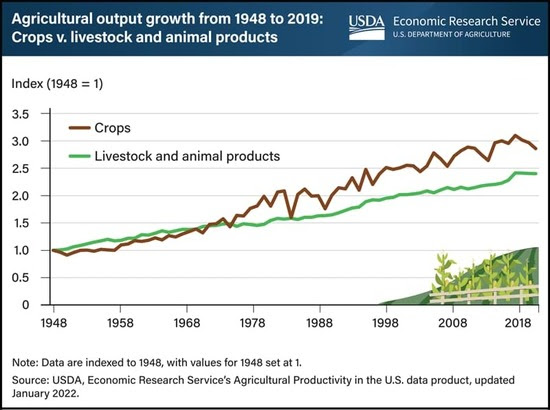|
USDA ANNOUNCES INITIATIVES TO CREATE "A FAIRER MARKET" FOR SEEDS AND OTHER AGRICULTURAL INPUTS
USDA release
USDA today released a report, titled "More and Better Choices for Farmers: Promoting Fair Competition and Innovation in Seeds and Other Agricultural Inputs," that includes recommendations for improving market fairness.
To view the full report click here.
USDA is taking immediate action on three of these recommendations:
• USDA's Agricultural Marketing Service (AMS) is standing up a new Farmer Seed Liaison, which will deliver on report recommendations. Specifically, the Seed Liaison will boost transparency and reduce confusion in a complex seed system by helping facilitate communication between farmers and plant breeders and the patent system.
• USDA and the U.S. Patent and Trademark Office (USPTO) are forming a Working Group on IP & Competition in Seeds and Other Agricultural Inputs, where USDA and USPTO, together with the Department of Justice and the Federal Trade Commission, will work to promote fair competition in the seed market.
• Additionally, AMS is releasing today a Notice to Trade regarding compliance with disclosing the kind and variety of seeds under the Federal Seed Act. The Notice underscores that farmers and seed businesses should know the kind and variety of the seed that they are getting from producers. USDA will also expand its FarmerFairness.gov portal to enable farmers and seed businesses to report tips and complaints related to competition and consumer protection in the seed markets.
The report also underscores the importance of public investment in plant breeding to promote resiliency and competition and enable farmers to better adapt to local and regional needs.
As part of its efforts to enhance fair and competitive markets, and in response to President Biden's historic Executive Order on "Promoting Competition in the American Economy," USDA sought input from the public about the impacts of concentration, market power, and intellectual property in the market for seeds and other agricultural inputs.
In particular, this focused on the effects to competition and market access for farmers, seed businesses, and other new and growing market competitors, especially small and medium-sized enterprises.
USDA's Agricultural Marketing Service partnered with the University of Wisconsin to summarize the findings outlined in the report. The report reflects significant consultation across USDA and with USPTO's Director and staff, Department of Justice Antitrust, and the Federal Trade Commission.
USDA and its academic cooperator, Dr. Julie Dawson, a plant scientist at the University of Wisconsin-Madison, utilized comments received during the public comment period and listening session to inform this report.
The report focuses on three ways to provide more and better seed choices to farmers:
1) working with the U.S. Patent and Trademark Office to enhance robust and reliable intellectual property rights that appropriately take into consideration the farmer's and plant breeder's voice and expertise,
2) ensuring that seed businesses are engaged in fair competition and are not unfairly taking advantage of market power, and
3) investing in the critical national infrastructure of more diverse seed variety development and stewardship to address local and regional food system needs and build greater resiliency into our food supply chains.
In each of these sections, the report analyzes the current situation and makes recommendations that the U.S. Government can implement to promote fair competition and innovation.
More information is available here.
These initiatives are part of the Biden-Harris Administration's whole-of-government efforts to promote fair competition, innovation, and resiliency across food and agriculture, and parallel efforts by USDA to promote more and better choices for farmers by:
*investing more than $1 billion in more competitive meat and poultry processing options,
*$500 million in new domestic sustainable fertilizer capacity;
*enhancing transparency and modernizing competition enforcement through new Packers & Stockyards Act rules, a Cattle Contract Library Pilot, and more.
Enabling farmers and ranchers to better secure value from their products such as through the proposed rule on Product of USA also announced today.
Editor's Note: Why are we reminded the famous saying "I'm from the government and I'm here to help?" Another might be "a solution looking for a problem." We're all for a level playing field but when this Justice Department gets involved in virtually anything there is scant evidence conditions improve. The solutions for "too few" meat processors in the U.S. didn't go well with associations representing animal agriculture so we'll be a keeping an eye on how this plays out.
|
 USDA: CROPS PRODUCTION GROWS FASTER THAN LIVESTOCK AND ANIMAL PRODUCTS PRODUCTION FROM 1948 TO 2019
USDA: CROPS PRODUCTION GROWS FASTER THAN LIVESTOCK AND ANIMAL PRODUCTS PRODUCTION FROM 1948 TO 2019 USDA: CROPS PRODUCTION GROWS FASTER THAN LIVESTOCK AND ANIMAL PRODUCTS PRODUCTION FROM 1948 TO 2019
USDA: CROPS PRODUCTION GROWS FASTER THAN LIVESTOCK AND ANIMAL PRODUCTS PRODUCTION FROM 1948 TO 2019